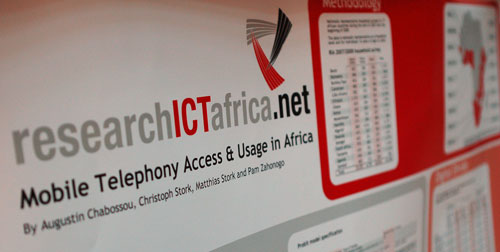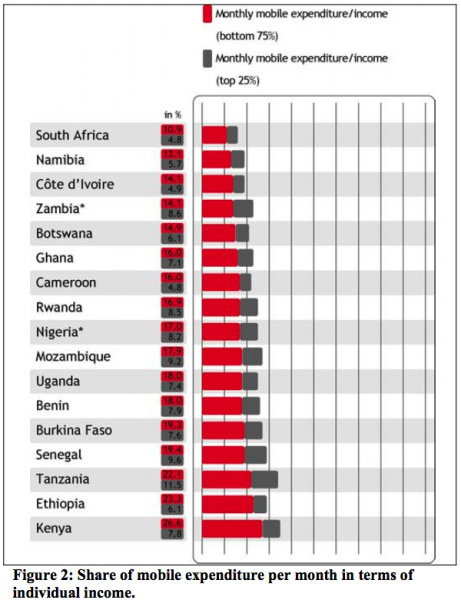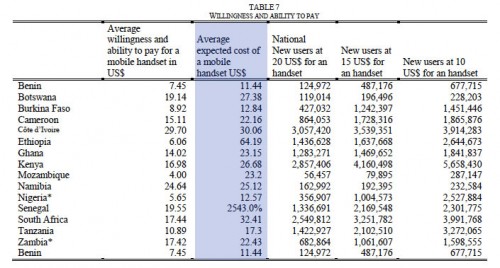For the past few days I’ve been in Qatar doing a joint demonstration of Ushahidi with Ken Banks of FrontlineSMS at the ICTD conference. One of the interesting projects that I ran across was ResearchICTAfrica.net, who have been doing a study on mobile phone access and usage in Africa. They did over 22,000 surveys in 17 countries to compile this report.
Some takeaways:
- Lower levels of ICT access and usage in Africa can be attributed to weak telecommunications infrastructure, generally low economic activity, irregular electricity and a lack of human resources.
- Income and education vastly enhances mobile adoption (over gender, age or social networks).
- Mobile expenditure is inelastic, meaning higher income individuals spend a smaller proportion of their income.
Charts
There are a number of interesting charts within the paper. One of which shows the elasticity of usage depending upon income (top 25% of the population vs bottom 75%).
Personally, I was fascinated to see a study on the average expected cost of a mobile handset.
I’ve got a PDF version of the report here. Like this conference, it’s mired in academic language, but it’s an incredibly informative and useful report if you can get past that:
ResearchICTAfrica Report – ICTD 2009 [PDF]
(sidenote: the academics here at this conference could use a course in communications, it’s often difficult to decipher what they’re actually trying to say…).



April 19, 2009 at 8:30 am
Any idea what the actual Senegal number is supposed to be for ‘expected cost’? I bet if US was on there it would be $0 b/c we’re wrapped up in contracts that give us ‘free’ phones to start out.
Interesting how the ‘willingness’ to pay vs. ‘expect’ to pay numbers are not consistent at all. In Cote d’Ivoire, it’s almost the same number, whereas in Ethiopia what they are willing to pay vs what they expect to pay is over 10x as much.
April 19, 2009 at 10:56 am
Wondering about the dimension of language and localization of interfaces. I think there may be a conflation of factors under “income and education” including the ability to use the only available language available (where at least in theory – and increasingly in practice – other language interfaces could be provided). The situation is complicated a bit by sociolinguistic attitudes (Europhone languages in Africa tend to have higher status) and educational factors (many states do little or nothing to educate citizens in their first languages). Nevertheless, a thorough study of mobile phone access and usage in Africa (one of the most multilingual world regions) would have to address the issues of interface language.
April 20, 2009 at 12:39 pm
Check out the video interview with Alex Comninos from Research ICT Africa at MobileActive08 …
http://ict4d.at/2009/02/16/how-to-get-the-unbanked-banked/
April 21, 2009 at 10:21 pm
Why are phones so expensive in Ethiopa?